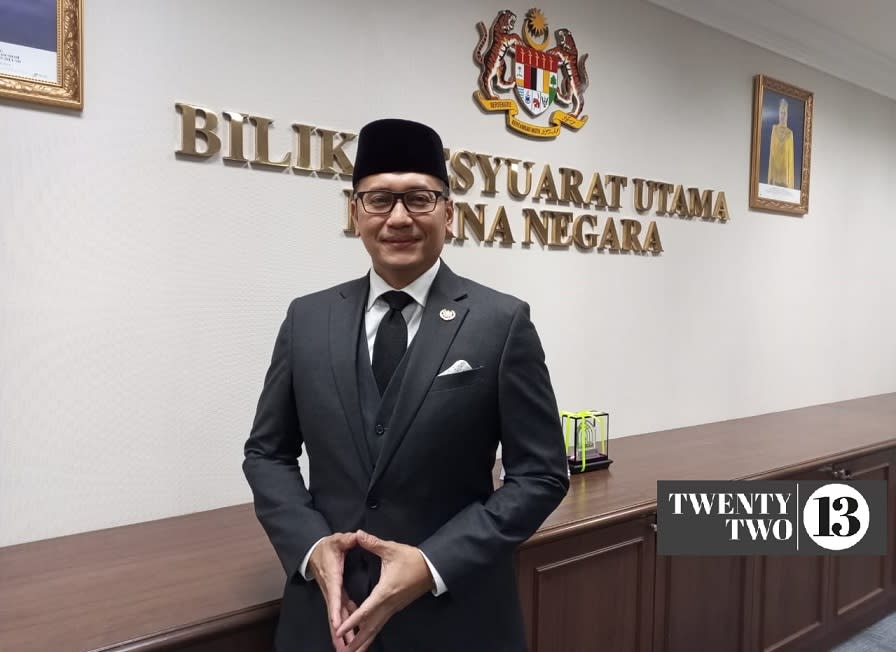It’s easier to care for a ‘raja berjiwa rakyat’ than ‘rakyat berjiwa raja’, says Istana Negara’s deputy Grand Chamberlain

A white handkerchief was tucked neatly in his jacket’s breast pocket. He sat upright on the chair, often flashing a smile while sharing tales of his service in Istana Negara.
Sophian Ab Rahman is the deputy Grand Chamberlain at Malaysia’s national palace. The 47-year-old, from Kota Bharu, Kelantan, has served Istana Negara for 12 years, overseeing matters related to protocol and ceremonies involving the Yang di-Pertuan Agong and the Raja Permaisuri Agong.
“There’s a lot of preparation that takes place to ensure that every single ceremony or event involving our Yang di-Pertuan Agong and Raja Permaisuri Agong is carried out smoothly without any disruptions,” said Sophian.
“We have to maintain our decorum, manners, and the glory and sovereignty worthy of the Agong as the head of state, and head of Islam in Malaysia.
“When involving protocol, we have to be detailed .. from what we wear, how we pay our respects, and communicate with the royal vocabulary. Even body language is important. For example, one shouldn’t sit cross-legged in front of His Majesty, and one should not speak loudly.”
Sophian is no stranger to giving talks about the rules attached to the royal institution. He believes in the saying “Tak kenal maka tak cinta” (Not knowing is hence not loving), adding that every Malaysian needed to understand the importance of the royal institution.
“There are many things that we can learn from our royals. Yang di-Pertuan Agong, Al-Sultan Abdullah Ri’ayatuddin Al-Mustafa Billah Shah, and his consort, Tunku Azizah Aminah Maimunah Iskandariah, are very close to the people. It’s easier to care for ‘raja berjiwa rakyat’, than ‘rakyat berjiwa raja’ (royalty with the soul of the people, instead of people with the soul of royalty).
“They truly care for the people,” added Sophian, when met at Istana Negara recently.
Sophian also reminded the people to appreciate the beauty of Bahasa Istana (the royal language). He said the words used provided a glimpse into history, as did the architecture of the palace.
“The Istana is reflective of the tradition. It is often situated on a hill, mainly due to security reasons, while the domes are reflective of a mosque. The palace is not just bricks and stones but a symbol.
“We use words like ‘berangkat tiba’ or ‘berangkat lepas’ (to arrive or depart), ‘mengurniakan’ (to bestow) ... We don’t say ‘tidur’ (sleep). Instead the word ‘beradu’ is used. When we want to go to the loo, we don’t say ‘ke bilik air’, but we use the phrase ‘ke sungai’ instead.
“The proper way to clasp our hands when we meet the King is to ensure that the elbows are raised. In the early days, people used to carry the keris with them, and when your arms are raised, one will be able to see the keris tucked in. It was for security reasons. Today, one can bow when greeting our Agong and Raja Permaisuri Agong.”
Sophian said the language used, and protocol in the palace are handed down from generation to generation.
“As the Malay saying goes, ‘Biar mati anak, jangan mati adat’ (Better for your children to die, than your traditions),” he added.
The rotation of the Malay Rulers who go on to become the Yang di-Pertuan Agong has remained intact since the first Agong, Tuanku Abdul Rahman Tuanku Muhammad from Negeri Sembilan (Aug 31, 1957, to April 1, 1960). The Sultan of Johor, Sultan Ibrahim Iskandar, will begin his reign as the 17th Yang di-Pertuan Agong, on Jan 31.
“That shows the strength of the brotherhood among the Malay Rulers. During the Conference of Rulers to elect the next Agong, the most junior Malay Ruler (not in age but in the number of years serving as Sultan) will be tasked to count the votes placed in a special vase. He will then go on to burn the votes with a long yellow lighter.”
“During the installation of a new Agong, His Majesty will kiss the keris. That shows that he is now not just the ruler of his state, but the Federation. It is a symbol of unity. His Majesty will also kiss the Al-Quran, showing that he will rule in fairness based on the teachings of Islam.”
Sophian added that the royal institution must be protected at all costs.
“When we saw the Covid-19 pandemic and the political instability, the Agong became the hero. Imagine if we didn’t have a head of state. Tuanku Agong (Al-Sultan Abdullah) has his charisma and aura. That is why we need such a head of state ... he isn’t an individual, but a symbol of unity.”
Sophian also shared what Al-Sultan Abdullah was like on a personal level.
“Tuanku Agong is extremely punctual. His parents taught him well and it’s evident in how he carries out his duties, even wading through flood waters to meet flood victims. He works out a lot, too.
“Tuanku Agong cares a lot about animals and insists that we must respect nature. He has been getting his brother Rulers to plant a tree at Istana Negara. Those are the small things that can make a difference,” he added.
The post It’s easier to care for a ‘raja berjiwa rakyat’ than ‘rakyat berjiwa raja’, says Istana Negara’s deputy Grand Chamberlain appeared first on Twentytwo13.


